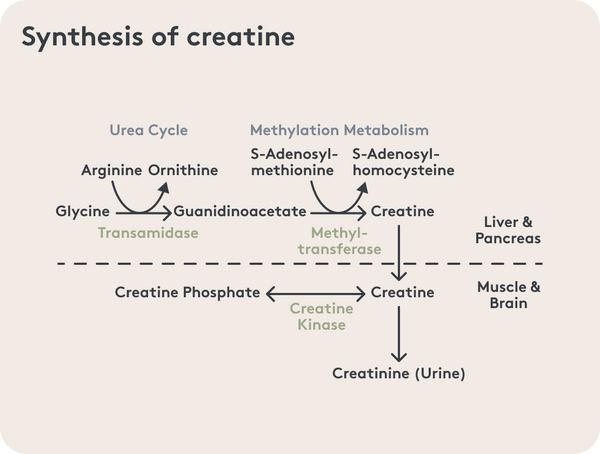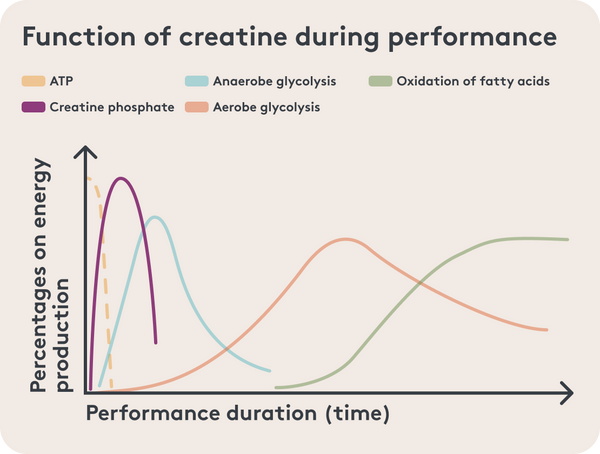Themen dieses Blogartikels:
Introduction
What does creatine really do during sports?
Every athlete, at least every strength athlete, knows creatine and its advertised effects. Are you asking yourself what creatine really does? Then you've come to the right place. Because in this blog article we will go into creatine and its function, explain to you what creatine actually is and whether creatine influences muscle building.
Finally, we give you tips on how to take it. You can also look forward to reading exciting sources in the bibliography, some of which also describe the influence of creatine on areas of life other than sports.
Finally, we give you tips on how to take it. You can also look forward to reading exciting sources in the bibliography, some of which also describe the influence of creatine on areas of life other than sports.
Knowledge for your ears!
No time to read? Here you can listen to Claire's article.
Table of Contents
• What is creatine?
• How does creatine work in your body?
• Does creatine affect your muscle growth?
• What is the best way to take creatine?
• Bibliography
• How does creatine work in your body?
• Does creatine affect your muscle growth?
• What is the best way to take creatine?
• Bibliography
What is creatine?
Creatine is an amino acid, right? Well, no, not really. Creatine is actually not a amino acid, although many refer to this structure as an amino acid. Nevertheless, creatine has similarities with amino acids and is also formed from the three amino acids arginine, glycine and methionine. This already says that your body partially produces this substance itself - about one gram daily1. However, your body needs at least 2 grams of creatine daily - so the rest is supplied through food.
And of course, production depends on the availability of the required substances. Especially methionine, which is converted to SAMe (S-adenosylmethionine), is also needed in many other parts of your body. In the case of a deficiency, creatine synthesis then tends to come up short.
It goes one step further: creatine does not remain creatine. In order to be effective, the creatine produced or ingested is converted into creatine phosphate in the muscles. By the way: 95 percent of creatine storage is in your muscles2. Two-thirds is available in the form of creatine phosphate. In your muscles, therefore, creatine must play a major role. Which?
And of course, production depends on the availability of the required substances. Especially methionine, which is converted to SAMe (S-adenosylmethionine), is also needed in many other parts of your body. In the case of a deficiency, creatine synthesis then tends to come up short.
It goes one step further: creatine does not remain creatine. In order to be effective, the creatine produced or ingested is converted into creatine phosphate in the muscles. By the way: 95 percent of creatine storage is in your muscles2. Two-thirds is available in the form of creatine phosphate. In your muscles, therefore, creatine must play a major role. Which?

How does creatine work in your body?
Let's talk about the effect of creatine: When you tense your muscles, for example during sports, energy is needed to maintain this contraction. Your body uses energy in the form of the energy carrier ATP - or adenosine triphosphate. Now we come to the problem. After just a few seconds, the ATP store of your muscles is used up. What happens now?
That's where our creatine, in the form of creatine phosphate, comes into play. This phosphate in the name can regenerate ATP, so that the contraction can be maintained for the time being - without gaining energy by other means. This is particularly important in weight training, as energy production is initially mainly anaerobic, i.e. without oxygen. This is fast, but unfortunately not very efficient. Glucose, which is the sugar used for energy production, is broken down to lactate.
You may be familiar with lactate. This acidic molecule accumulates in the muscle and must be transported to the liver via the blood. If a particularly large amount of lactate accumulates, this can lead to muscle building being impaired - because the acidic product can lead to over-acidification of the muscle. After a few minutes, the muscle ideally switches again - then oxygen is used for energy production.
Back to creatine: why is this substance beneficial in training?
You may be familiar with lactate. This acidic molecule accumulates in the muscle and must be transported to the liver via the blood. If a particularly large amount of lactate accumulates, this can lead to muscle building being impaired - because the acidic product can lead to over-acidification of the muscle. After a few minutes, the muscle ideally switches again - then oxygen is used for energy production.
Back to creatine: why is this substance beneficial in training?

It is actually logical. By postponing the start of anaerobic energy production, the lactate production that exhausts the muscle is also postponed and the contraction can be held for a longer time in a less stressful way. This is especially advantageous in strength training - because here the load is particularly intense and short-term.
And this brings us to the next point: Does creatine influence muscle building, especially during strength training?
And this brings us to the next point: Does creatine influence muscle building, especially during strength training?
Does creatine affect your muscle growth?
This question can be answered quite quickly with "yes". Because creatine influences energy production in the muscle and delays muscle fatigue, creatine can be beneficial in building muscle mass3.
Other effects in muscle are still being researched, however, it is possible that creatine also supports muscle growth by altering the activity of specific genes4. In addition, creatine is stored in the muscles with water, providing the typical "pump effect" that is usually quite desirable in strength training.
It has even been shown that physical performance5. Effects of creatine supplementation on muscle power, endurance, and sprint performance.
Other effects in muscle are still being researched, however, it is possible that creatine also supports muscle growth by altering the activity of specific genes4. In addition, creatine is stored in the muscles with water, providing the typical "pump effect" that is usually quite desirable in strength training.
It has even been shown that physical performance5. Effects of creatine supplementation on muscle power, endurance, and sprint performance.
What is the best way to take creatine?
Creatine is typically taken as creatine monohydrate. This is the most common active ingredient, and the one with which most studies on creatine effects have been conducted. Now there are only two questions: "How much creatine should I take?" and "Is it better to take a single supplement or take creatine in combination with other nutrients?"
How much creatine should I take?
Creatine is considered a safe dietary supplement. It is often stated that high doses can cause kidney problems, but these are isolated cases, so this argument can be refuted in good conscience6. It is important to always drink enough water to take creatine. The amount to take depends on your weight. Since it is a safe supplement, there is not much risk of overdose. We recommend a consistent intake of 3 to 5 grams of creatine per day, depending on weight, of course. By the way: taking creatine is also suitable for women. Here, there is often the fear that the muscles become "too big" or that the physique changes. Here we can reassure you: Creatine promotes muscle building and stores in the muscles, but the whole body does not change, because creatine is not a steroid or the like.
So the rule is: 3 to 5 grams of creatine a day will ensure that you are optimally supplied.
How should I take creatine?
If you know MITOcare, you already know what we say. The goal of our products is to come as close as possible to nature in its complexity. That's why you can find creatine in some of our products - often in combination with various amino acids and other substances that support connective tissue and muscles. Of course, you can also take creatine as a single supplement. But why, when you can cover several nutrients with one product?
How much creatine should I take?
Creatine is considered a safe dietary supplement. It is often stated that high doses can cause kidney problems, but these are isolated cases, so this argument can be refuted in good conscience6. It is important to always drink enough water to take creatine. The amount to take depends on your weight. Since it is a safe supplement, there is not much risk of overdose. We recommend a consistent intake of 3 to 5 grams of creatine per day, depending on weight, of course. By the way: taking creatine is also suitable for women. Here, there is often the fear that the muscles become "too big" or that the physique changes. Here we can reassure you: Creatine promotes muscle building and stores in the muscles, but the whole body does not change, because creatine is not a steroid or the like.
So the rule is: 3 to 5 grams of creatine a day will ensure that you are optimally supplied.
How should I take creatine?
If you know MITOcare, you already know what we say. The goal of our products is to come as close as possible to nature in its complexity. That's why you can find creatine in some of our products - often in combination with various amino acids and other substances that support connective tissue and muscles. Of course, you can also take creatine as a single supplement. But why, when you can cover several nutrients with one product?
Bibliography
1 Berger, C. (2009). Nahrungsergänzungsmittel und ausgewählte Stoffe am Beispiel von Frauen. Diplomarbeit. Universität Wien.
2 Schek, A. (2000). Kreatin-Supplemente für jedermann? Sportmedizin, 2, 58-62.
3 Wu, S. H., Chen, K. L., Hsu, C. et al. (2022). Creatine Supplementation for Muscle Growth: A Scoping Review of Randomized Clinical Trials from 2012 to 2021. Nutrients, 14(6), 1255. https://doi.org/10.3390/nu14061255
4 Farshidfar, F., Pinder, M. A., Myrie, S. B. (2017). Creatine Supplementation and Skeletal Muscle Metabolism for Building Muscle Mass- Review of the Potential Mechanisms of Action. Current protein & peptide science, 18(12), 1273–1287. https://doi.org/10.2174/1389203718666170606105108
5 Izquierdo, M., Ibañez, J., González-Badillo, J. J., & Gorostiaga, E. M. (2002). Effects of creatine supplementation on muscle power, endurance, and sprint performance. Medicine and science in sports and exercise, 34(2), 332–343. https://doi.org/10.1097/00005768-200202000-00023
6 Kreider, R. B., Kalman, D. S., Antonio, J. et al. (2017). International Society of Sports Nutrition position stand: safety and efficacy of creatine supplementation in exercise, sport, and medicine. Journal of the International Society of Sports Nutrition, 14(1), https://doi.org/10.1186/s12970-017-0173-z
2 Schek, A. (2000). Kreatin-Supplemente für jedermann? Sportmedizin, 2, 58-62.
3 Wu, S. H., Chen, K. L., Hsu, C. et al. (2022). Creatine Supplementation for Muscle Growth: A Scoping Review of Randomized Clinical Trials from 2012 to 2021. Nutrients, 14(6), 1255. https://doi.org/10.3390/nu14061255
4 Farshidfar, F., Pinder, M. A., Myrie, S. B. (2017). Creatine Supplementation and Skeletal Muscle Metabolism for Building Muscle Mass- Review of the Potential Mechanisms of Action. Current protein & peptide science, 18(12), 1273–1287. https://doi.org/10.2174/1389203718666170606105108
5 Izquierdo, M., Ibañez, J., González-Badillo, J. J., & Gorostiaga, E. M. (2002). Effects of creatine supplementation on muscle power, endurance, and sprint performance. Medicine and science in sports and exercise, 34(2), 332–343. https://doi.org/10.1097/00005768-200202000-00023
6 Kreider, R. B., Kalman, D. S., Antonio, J. et al. (2017). International Society of Sports Nutrition position stand: safety and efficacy of creatine supplementation in exercise, sport, and medicine. Journal of the International Society of Sports Nutrition, 14(1), https://doi.org/10.1186/s12970-017-0173-z


